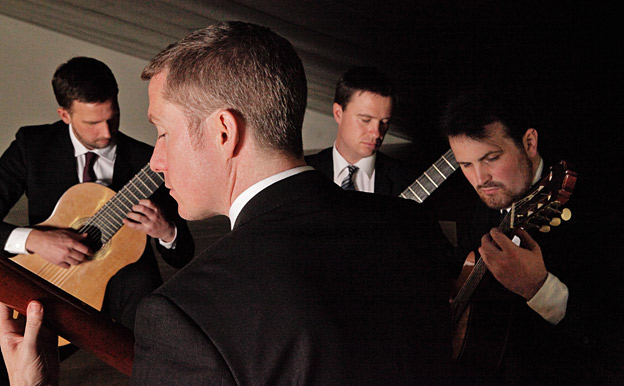By Stephen Brookes • The Washington Post • October 14, 2013
The classical guitar may have a quiet voice, but it makes up for it with a striking array of sonic colors, from drumming to delicate harmonics. Put four of the instruments together, and you have the best of both worlds: intricate detail and a near-orchestral palette of sound backed up by hall-filling power. That, anyway, was the takeaway from the Dublin Guitar Quartet’s engaging recital at the Phillips Collection on Sunday, when the Irish ensemble presented a varied program of contemporary music that revolved around the minimalist axis of Philip Glass, Steve Reich and the Estonian composer Arvo Pärt. The afternoon opened (fittingly enough, after the drenching week) with Leo Brouwer’s “Cuban Landscape with Rain,” a tone poem evoking the shifting rain and winds of a passing storm. The Dublin players gave it an evocative reading, full of atmospheric turbulence and finely graded shades of light. Pärt’s “Summa” (in a transcription from the choral original) was just as luminous, very moving in its spare simplicity and its dignified, quiet grace.
The afternoon opened (fittingly enough, after the drenching week) with Leo Brouwer’s “Cuban Landscape with Rain,” a tone poem evoking the shifting rain and winds of a passing storm. The Dublin players gave it an evocative reading, full of atmospheric turbulence and finely graded shades of light. Pärt’s “Summa” (in a transcription from the choral original) was just as luminous, very moving in its spare simplicity and its dignified, quiet grace.
The quartet shifted gears for “Chimurenga” by David Flynn (a tribute to the Zimbabwean composer Thomas Mapfumo) which shimmered with lilting, African-flavored melodies, then ventured into rock music with the lyrical “Soundscapes Over Landscapes” by the Dublin rock band The Redneck Manifesto. “Musica Ricercata,” a collection of precise little miniatures from the 1950s by György Ligeti, tied up the concert with modernist style.
But the real heart of this refreshingly eclectic program was the music of Glass and Reich. That’s not necessarily a bad thing (though minimalism, to these ears, is starting to show its age), and Pat Brunnock (on electric guitar, with taped accompaniment) gave a driving account of Reich’s “Electric Counterpoint.” But Glass’s obsessive, repetitive music continues to divide audiences, and for every listener who finds it glowing with transcendent beauty, there’s another who thinks it’s like chewing on a rubbery piece of chicken — much work, little actual reward. The Dubliners offered up arrangements of Glass’s second string quartet (“Company”) and two movements of his fourth (“Buczak”) which, while easy enough on the ears, probably didn’t win converts to either side of the debate.